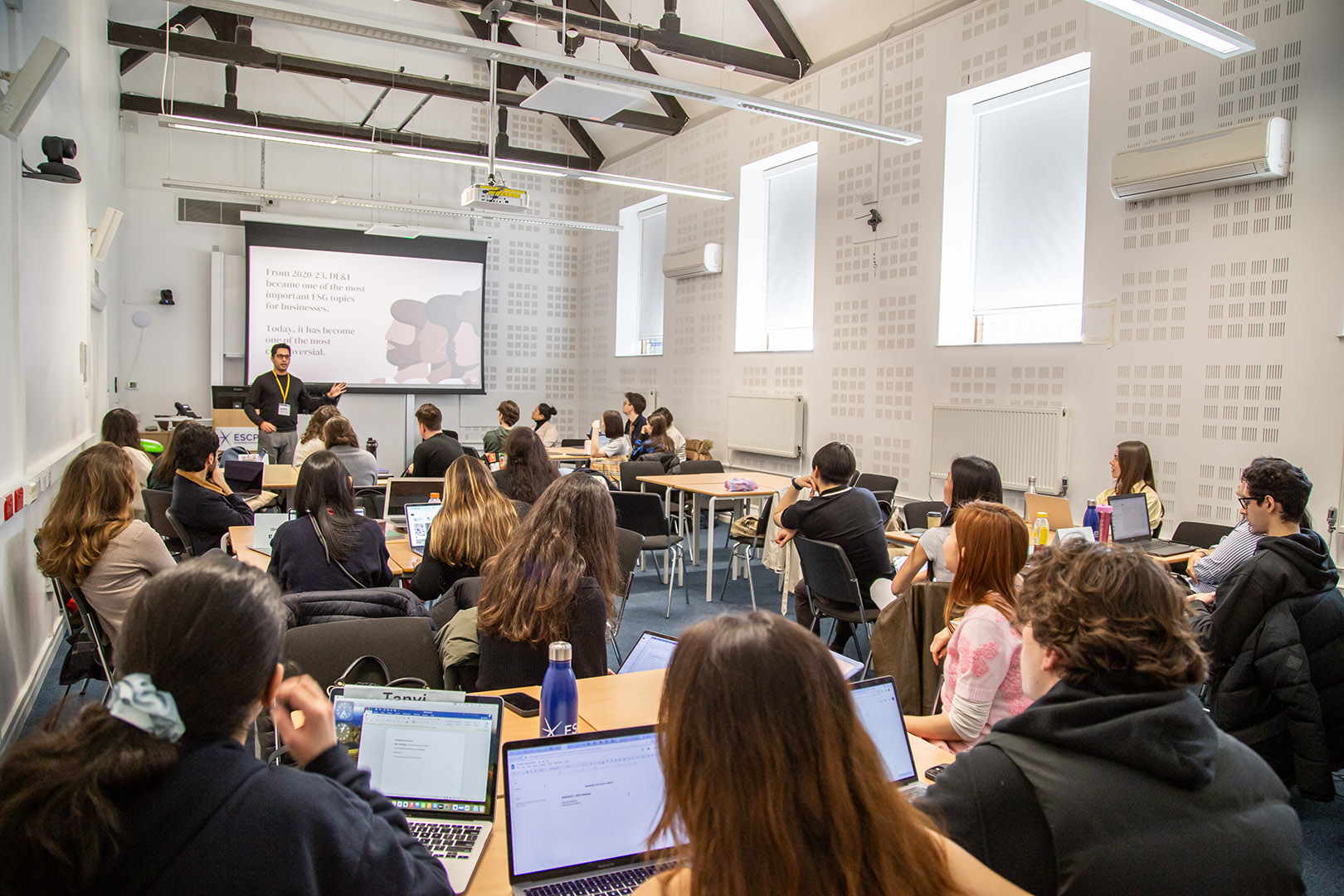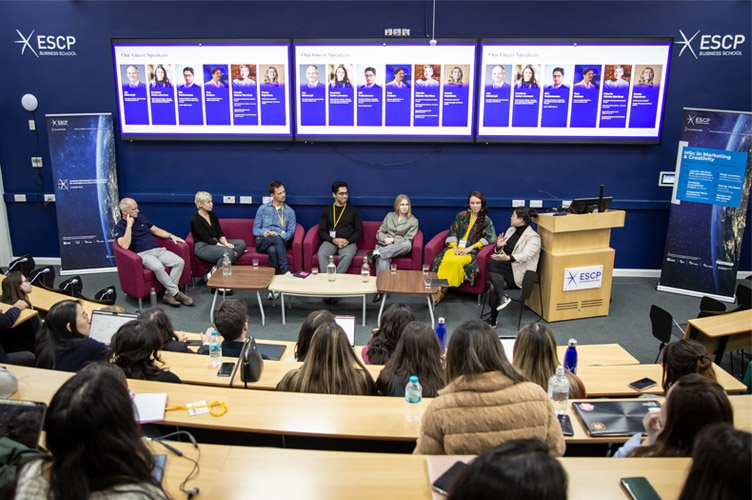On Thursday 4th April, ESCP Business School London Campus hosted its 3rd annual Social Impact Festival, bringing together students, thought leaders and experts from across different sectors.
This year, the Festival explored the intersection between social impact and environmental sustainability through immersive workshops and a panel discussion.
Organised by Vanezza Scanlon, an Affiliate Professor of Social Impact at ESCP Business School London Campus, the Festival emphasised a multi-perspective approach to sustainability that integrates ecological, environmental and social considerations for the future of leadership, outlining it as a top priority for any strategic and governance decision-making. The Festival highlighted that a fundamental shift in mindset is imperative to create a framework for a resilient business strategy, where sustainability becomes intrinsic to operations. Adopting such a paradigm would allow businesses to confront issues, instead of finding tempting short-term fixes, addressing the "why" and focusing on sustainable, long-term solutions.
“Bringing together students and professionals to work on business cases in small groups and then reflect more broadly on current challenges is a great way to bring relevance and insight to this complex topic involving business and society," says Joe Miemczyk, Associate Dean for Sustainability Transition at ESCP Business School. "The Social Impact Festival does this in a very engaging way, to highlight the systemic nature of sustainability and social issues and that impact solutions require a change in mindsets at all levels of business.”
Through immersive workshops and an engaging fireside chat panel discussion, attendees were inspired to integrate sustainable practices into their personal and professional endeavors, sparking a ripple effect of positive change.
Supporting the immersive learning approaches of the School, the Festival also served as a platform for co-creative learning, where diverse perspectives merged to foster innovation and collaboration, leaving a positive mark on all who attended.
"As a lecturer, I want to instil a holistic sustainability mindset in our students and nurture their decision-making agility in this space," shares Vanezza Scanlon. "By blending classroom-based theoretical starting points and critical discussions with experiential learning journeys, such as the Social Impact Festival and practical group projects, students have the opportunity to engage directly with experts and organisations. This is key to prepare them to tackle real-life scenarios and collaboratively devise practical solutions for societal challenges."

Throughout the day, the MSc in Marketing & Creativity and Master in Management students explored the mutual importance of social and environmental sustainability with experts in the field. They were able to choose from three different workshops to attend:
- A 'Marketing for social impact: A DEI perspective' workshop with Giri Venkatraman, Publicis Groupe Growth Director and MSc in Marketing & Creativity Class of 2020 student. This session offered a perspective on change management efforts an organisation can make, shifting from producing one-off inclusive marketing campaigns to becoming a truly inclusive organisation, where marketing is a reflection of its organisational culture.
- An 'Unearthing the ESG – social impact imperative' workshop with Karl Satinitigan, Founder of Meron, a B2B asset sharing platform for businesses to transition towards more circular business models. The session offered a cross-sectorial social impact imperative with focus on the corporate challenges and opportunity to partner and conduct effective social impact screening.
- A 'Systems thinking for effective social and sustainability impact' workshop with Courtney Savie Lawrence, UN Development Programme Senior Advisor for Climate, Technology, Systems and Sustainability Innovation. The session offered the opportunity to work on a real hybrid-topic case study and apply systems thinking for effective social impact by understanding the multilayered nature of the often complicated and complex sustainability challenges.
These workshops allowed students to address and challenge how different organisations deliver DEI commitments through marketing; learn from a real-life case study on the Circular Design Lab from Bangkok Thailand; workshop their way towards a ready-to-use impact strategy; and develop a pitch addressing a carbon credit and community impact assessment conundrum.
The Festival culminated with a fireside chat panel discussion that underscored the importance for organisations to rethink their governance frameworks and decision-making processes to align with the evolving landscape of business and society.
Leading the discussion, the panel speakers included:
- Prof. Joe Miemczyk, Associate Dean of Sustainability Transition at ESCP Business School
- Giri Venkatraman, MSc in Marketing & Creativity Class of 2020 and Publicis Groupe Growth Director
- Courtney Savie Lawrence, UNDP Senior Advisor Inclusive Climate Innovation
- Tom Graham, Social Entrepreneur, MAD Courses EdTech
- Priscila Chaves Martínez, Antarctic Science Explorer, AI Ethics researcher for University of Cambridge
- Hanna Kopelman, current MSc in Marketing & Creativity Student and Project Manager at Valtech Radon
The speakers urged that rather than falling to the temptation of hastily embracing different technological solutions for quick fixes, companies need to invest time to understand the problem in a more comprehensive way, therefore fostering the discovery of long-term, sustainable solutions. They agreed that just as embracing scenario planning becomes an essential strategy for mitigating risks, transitioning organisational focus from product corporate competences to embedding sustainability in all operations should be at the forefront of all future-oriented businesses. Moreover, active listening and engagement with all stakeholders will act as a catalyst for driving meaningful change.
"The Social Impact Festival was a great opportunity to hear from practitioners in various fields share their views and examples of how social and environmental sustainability fit together," shares Hanna Kopelman. "Being part of the panel was also a great opportunity for me personally, allowing me to share my perspective as a student and connect with experts on the topic of social impact."
A special thank you goes to the team of five students from the Sustainability Management module on the MSc in Marketing & Creativity programme, who helped to make this event a success: Romain Jacquet, Solène Tran, Alena Fischer, Darshi Shah, and Hanna Kopelman.
Campuses
